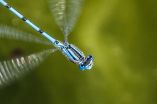(Press-News.org) Hilo, Hawai`i–The Earth's soils store four times more carbon than the atmosphere and small changes in soil carbon storage can have a big effect on atmospheric greenhouse gas concentrations. A new paper in the journal Nature Climate Change concludes that climate warming does not accelerate soil organic carbon decomposition or affect soil carbon storage, despite increases in ecosystem productivity.
The research, led by U.S. Forest Service Research Ecologist Dr. Christian Giardina, with the agency's Institute of Pacific Islands Forestry, Pacific Southwest Research Station, with co-authors Drs. Creighton Litton and Susan Crow (University of Hawai`i at Manoa), and Dr. Greg Asner (Carnegie Institution for Science), shows that soil carbon storage was constant across a highly constrained 5 degrees Celsius gradient of mean annual temperature in tropical montane wet forest in Hawai`i.
The scientists also showed an increase in productivity across the gradient, both above and belowground, and an increase in the decomposition rate of fresh litter and a decline in coarse woody debris with warming. From these results, they concluded that long-term warming in tropical montane forests will accelerate carbon cycling, but is unlikely to cause net losses of soil carbon.
"Given our findings, we expect that warming alone, that is in the absence of other changes such as drying or increased fire, will not accelerate the loss of carbon from mineral soils," says Giardina. "This means that tropical soils will not become a net source of CO2 to the atmosphere."
The effects of warming on soil carbon storage are poorly quantified because it is difficult to assess how temperature change impacts processes below the soil surface. However, the temperature gradient used in this study provides an ideal study system for measuring ecosystem responses to warming over long periods of time. The scientists were careful to find a gradient of temperature change where potentially confounding factors were held constant, including vegetation composition, disturbance history, geology, and soil type and moisture. This allowed them to isolate the effects of changing temperature on ecosystem carbon storage and flux.
The scientists propose that where ecosystem carbon is unprotected, such as at the surface in plant debris, its decomposition and storage will respond strongly to warming. However, when carbon is protected in the soil, decomposer organisms have reduced access to that carbon and so decomposition or storage show little temperature sensitivity. And while climate warming will continue with the addition of greenhouse gases into the atmosphere due to human activities (fossil fuel combustion, land-use clearing), previous assumptions about a positive soil carbon cycling feedback to future warming may be incorrect.
While soil carbon storage and turnover was insensitive to warming, the decomposition of coarse wood and plant growth did increase, which means that the capacity of tropical ecosystems to retain carbon will depend on the balance of changes within each ecosystem.
INFORMATION:
To read the paper: http://www.treesearch.fs.fed.us/pubs/46423
Headquartered in Albany, Calif., the Pacific Southwest Research Station develops and communicates science needed to sustain forest ecosystems and other benefits to society. It has research facilities in California, Hawai`i and the U.S.–affiliated Pacific Islands. For more information, visit http://www.fs.fed.us/psw/.
Contact: Sherri Eng, PSW Research Station Public Affairs, sleng@fs.fed.us; (510) 559-6327
Study helps assess impact of temperature on belowground soil decomposition
2014-09-23
ELSE PRESS RELEASES FROM THIS DATE:
Facial masculinity not always a telling factor in mate selection
2014-09-23
EUGENE, Ore. -- Women living where rates of infectious disease are high, according to theory, prefer men with faces that shout testosterone when choosing a mate. However, an international study says not so much, says University of Oregon anthropologist Lawrence S. Sugiyama.
The new study, on which Sugiyama is one of 22 co-authors, ended with that theory crumbling amid patterns too subtle to detect when tested with 962 adults drawn from 12 populations living in various economic systems in 10 nations.
The study -- coordinated by Ian S. Penton-Voak of the School of Experimental ...
The mechanics of tissue growth
2014-09-23
PITTSBURGH – When the body forms new tissues during the healing process, cells must be able to communicate with each other. For years, scientists believed this communication happened primarily through chemical signaling. Now researchers at Carnegie Mellon University and the University of Pittsburgh have found that another dimension – mechanical communication – is equally if not more crucial. The findings, published in this week's issue of the Proceedings of the National Academy of Sciences, could lead to advancements in treatments for birth defects and therapies for cancer ...
Insects' fear limits boost from climate change, Dartmouth study shows
2014-09-23
Scientists often measure the effects of temperature on insects to predict how climate change will affect their distribution and abundance, but a Dartmouth study shows for the first time that insects' fear of their predators, in addition to temperature, ultimately limits how fast they grow.
"In other words, it's less about temperature and more about the overall environmental conditions that shape the growth, survival and distribution of insects." says the study's lead author Lauren Culler, an Arctic postdoctoral researcher at Dartmouth.
The study appears in the journal ...
Kessler Foundation researchers find foot drop stimulator beneficial in stroke rehab
2014-09-23
West Orange, NJ. September 23, 2014. Kessler Foundation scientists have published a study showing that use of a foot drop stimulator during a task-specific movement for 4 weeks can retrain the neuromuscular system. This finding indicates that applying the foot drop stimulator as rehabilitation intervention may facilitate recovery from this common complication of stroke. "EMG of the tibialis anterior demonstrates a training effect after utilization of a foot drop stimulator," was published online ahead of print on July 2 by NeuroRehabilitation (doi:10.3233/NRE-141126). The ...
'Brain Breaks' increase activity, educational performance in elementary schools
2014-09-23
CORVALLIS, Ore. – A recent Oregon survey about an exercise DVD that adds short breaks of physical activity into the daily routine of elementary school students found it had a high level of popularity with both students and teachers, and offered clear advantages for overly sedentary educational programs.
Called "Brain Breaks," the DVD was developed and produced by the Healthy Youth Program of the Linus Pauling Institute at Oregon State University, and is available nationally.
Brain Breaks leads children in 5-7 minute segments of physical activity, demonstrated by OSU ...
Surveys may assess language more than attitudes, says study involving CU-Boulder
2014-09-23
Scientists who study patterns in survey results might be dealing with data on language rather than what they're really after -- attitudes -- according to an international study involving the University of Colorado Boulder.
The study, published in the journal PLOS ONE, found that people naturally responded to surveys by selecting answer options that were similar in language to each other as they navigated from one question to another, even when the similarities were subtle.
For the study, researchers looked specifically at surveys on organizational behavior, such as ...
Researchers reveal new rock formation in Colorado
2014-09-23
Boulder, Colo., USA - An astonishing new rock formation has been revealed in the Colorado Rockies, and it exists in a deeply perplexing relationship with older rocks. Named the Tava sandstone, this sedimentary rock forms intrusions within the ancient granites and gneisses that form the backbone of the Front Range. The relationship is fascinating because it is backward: ordinarily, it is igneous rocks such as granite that would that intrude into sedimentary rocks.
According to authors Christine Smith Siddoway and George E. Gehrels, to find sandstone injected into granite ...
Note to young men: Fat doesn't pay
2014-09-23
Men who are already obese as teenagers could grow up to earn up to 18 percent less than their peers of normal weight. So says Petter Lundborg of Lund University, Paul Nystedt of Jönköping University and Dan-olof Rooth of Linneas University and Lund University, all in Sweden. The team compared extensive information from Sweden, the United Kingdom and the United States, and the results are published in Springer's journal Demography.
The researchers analyzed large-scale data of 145,193 Swedish-born brothers who enlisted in the Swedish National Service for mandatory military ...
Immune system is key ally in cyberwar against cancer
2014-09-23
Research by Rice University scientists who are fighting a cyberwar against cancer finds that the immune system may be a clinician's most powerful ally.
"Recent research has found that cancer is already adept at using cyberwarfare against the immune system, and we studied the interplay between cancer and the immune system to see how we might turn the tables on cancer," said Rice University's Eshel Ben-Jacob, co-author of a new study this week in the Early Edition of the Proceedings of the National Academy of Sciences.
Ben-Jacob and colleagues at Rice's Center for Theoretical ...
UTSA microbiologists discover regulatory thermometer that controls cholera
2014-09-23
Karl Klose, professor of biology and a researcher in UTSA's South Texas Center for Emerging Infectious Diseases, has teamed up with researchers at Ruhr University in Bochum, Germany to understand how humans get infected with cholera, Their findings were released this week in an article published by the Proceedings of the National Academy of Sciences.
Cholera is an acute infection caused by ingestion of food or water that is contaminated with the bacterium Vibrio cholerae. An estimated three to five million cases are reported annually and 100,000-120,000 people die from ...




